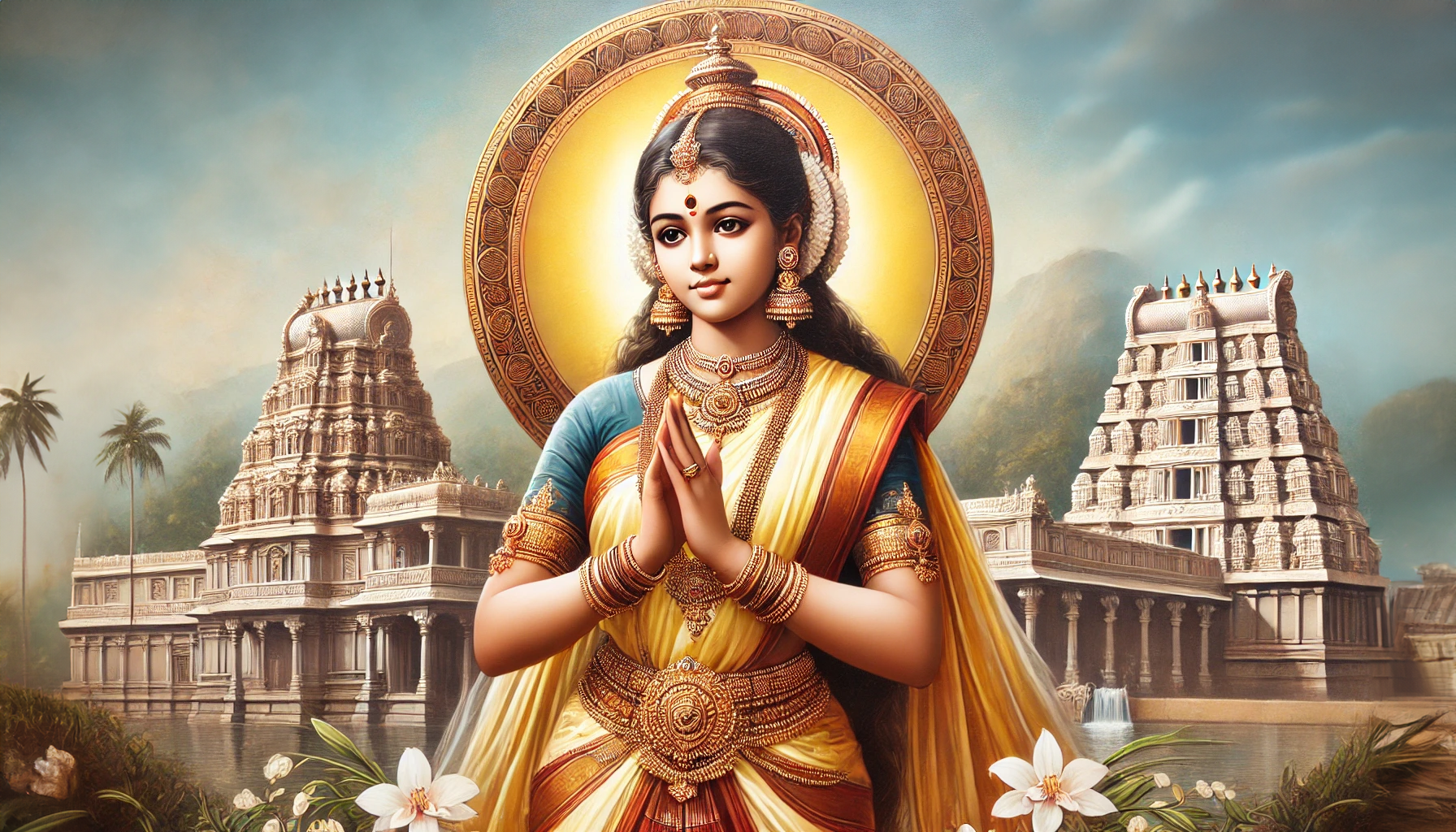In the vast landscape of Indian spiritual history, Andal’s story stands out as a shining example of unwavering devotion, purity of intent, and divine union. Revered as one of the twelve Alwars, the cherished devotees of Shree Vishnu, Andal’s journey reveals the transformative power of Bhakti, or divine love, in its purest form. Her legacy continues to inspire millions, crossing the boundaries of time, culture, and creed. Swami Mukundananda, a revered spiritual teacher and author, brings her story to life, elucidating timeless lessons for modern-day devotees seeking a path to the Divine.
The Birth of Andal: A Divine Discovery
Approximately 1,500 years ago, in Srivilliputtur, a village nestled near Madurai, there lived a devout Brahmin named Vishnu Chit. Widely respected for his piety, Vishnu Chit spent his days in worship and devotion to Shree Vishnu. One fateful day, while gathering Tulsi leaves for his daily offerings, he came across an infant girl lying near a Tulsi bush. Overwhelmed by wonder, he took the child into his arms and named her Kodai, a name symbolizing the divine garland of Tulsi leaves. She later came to be known as Andal, a name that would forever hold a special place in the hearts of devotees.

From her early days, Andal’s life was steeped in spirituality. Raised in an environment where Vishnu’s glory was celebrated through songs, prayers, and rituals, Andal absorbed the essence of devotion. Her heart was drawn especially to Bhagavan Krishna, captivated by the stories of his divine leelas (pastimes) with the Gopis of Vrindavan. Andal’s life became a testament to her unwavering faith and a journey that exemplifies the deep, mystical bond between the devotee and the Divine.
A Unique Form of Worship: The Flower Garland and Andal’s Love

As Andal blossomed into a young woman, her devotion to Shree Vishnu grew. Every day, she would string together garlands for the deity in the local temple. However, her method of offering these garlands was unlike the traditional practice. Andal would first adorn herself with the garland, checking in the mirror to ensure it was beautiful enough for her beloved Lord. This act was an intimate expression of her love—a way for her to feel connected to Vishnu as if he were her beloved.
One day, her father, Vishnu Chit, discovered a strand of her hair in the garland and was horrified, fearing that her actions might disrespect the deity. Though hurt, Andal complied and stopped wearing the garland herself. However, her love was so pure that Shree Vishnu himself intervened, appearing to her father in a vision, blessing Andal’s offerings and acknowledging her unparalleled devotion. This divine validation underscores a central tenet of Bhakti: God is moved by the love in one’s heart, not merely by external rituals.
As Swami Mukundananda explains, Andal’s story exemplifies the power of intent. Just as Shabari’s offering of half-eaten berries to Bhagavan Rama was accepted due to the sincerity of her heart, Andal’s garlands were imbued with the selfless love that transcends ritual. This purity of intention is the essence of Bhakti—a message that continues to resonate in today’s world, reminding us that genuine devotion lies in the heart’s intention, beyond rituals and formality.
Andal’s Poems: A Legacy of Bhakti in the Tiruppavai

Andal’s devotion found expression in her poetry, specifically in the Tiruppavai, a collection of thirty verses that continues to be recited by devotees across India, particularly during the Tamil month of Margazhi. In these verses, Andal pours her heart out, invoking Shree Vishnu’s blessings and expressing her desire for divine union. The Tiruppavai is a timeless masterpiece, filled with mystical and devotional insights, representing Andal’s Madhurya Bhava, or the romantic devotion towards the Divine.
The poems reveal Andal’s longing for a personal connection with Vishnu, a connection unbounded by worldly restrictions. Her verses are filled with symbols of divine love, illustrating her unwavering surrender. The Tiruppavai isn’t merely a poem; it is a celebration of divine love, symbolizing the soul’s yearning to merge with the Divine. Andal’s verses became her means of reaching her beloved Lord, embodying the very spirit of Bhakti that continues to inspire millions.
Lessons from Andal’s Devotion
Swami Mukundananda highlights the transformative power of devotion, as illustrated by Andal’s story. Her life and teachings impart several valuable lessons that resonate deeply with spiritual seekers:
- Pure Intent Over Ritual: True devotion is measured by the heart’s sincerity rather than external forms of worship. Andal’s story emphasizes the importance of inner purity. She teaches us that God responds to the love and sincerity in our hearts, even if our methods may not conform to traditional standards. For those navigating the spiritual path, Andal’s life serves as a reminder that Bhakti isn’t about rituals but about connecting deeply with the Divine.
- Total Surrender to the Divine: Andal’s journey is a testament to the power of surrender. By entrusting her life and heart to Vishnu, she found peace and fulfillment. Swami Mukundananda elaborates that surrender is the ultimate step in devotion, where one lets go of personal desires and allows the Divine to guide. This complete surrender brings about a transformation, freeing the soul from worldly attachments and drawing it closer to God.
- Diverse Expressions of Bhakti: Devotion is not confined to a single form. Andal expressed her love through poetry, garland-making, and simple acts imbued with devotion. Bhakti can be practiced in countless ways—through song, art, service, or meditation. The heart of Bhakti lies in its flexibility; it adapts to individual personalities and inclinations, allowing each person to find their own unique connection with the Divine.
- Spiritual Feminism and Andal’s Empowerment: Andal’s story is also an example of spiritual feminism, where she expressed her devotion and divine love without conforming to societal norms. She openly declared her love for Vishnu, transcending gender roles and societal expectations. Her life illustrates that true Bhakti knows no boundaries; it is a force that empowers and elevates, free from any form of worldly discrimination.
Bhakti as the Path to Liberation: Swami Mukundananda’s Insights
Swami Mukundananda emphasizes that Bhakti, or devotion, is one of the most accessible spiritual paths, especially in the modern era. Unlike other spiritual paths that may require strict discipline or renunciation, Bhakti welcomes all, regardless of their background. It allows each person to connect with the Divine in their own way, through acts that resonate with their individual nature.
According to Swami Mukundananda, Bhakti is the simplest yet most profound way to reach God. A single act done with devotion—a leaf, a flower, or a simple prayer—can connect us with the Divine. Bhakti transcends caste, gender, and socioeconomic status, providing a universal path to spiritual growth and fulfillment. This inclusive nature of Bhakti is what makes it so appealing, as it aligns with the innate human desire to connect with something greater than oneself.
Andal’s life is a living example of this path. Her devotion wasn’t bound by rituals or social norms; it was a pure, all-consuming love that led her to merge with the Divine. Her story reminds us that Bhakti is not about external actions but about the continuous remembrance of God, where every thought, word, and action is an offering to the Divine.
Call to Action

To delve deeper into the timeless teachings of Bhakti and gain a better understanding of life’s purpose, explore Swami Mukundananda’s latest book, Nourish Your Soul. This enlightening guide offers insights into connecting with the Divine through love, surrender, and selflessness, echoing Andal’s path of devotion. Buy your copy today from JKYog and embark on a journey of self-discovery and divine connection, drawing inspiration from the legacy of saints like Andal.
By diving into the story of Andal, we are reminded of the timeless power of devotion and the purity of Bhakti. Andal’s legacy serves as a beacon for those on the path of love and surrender, teaching us that a true connection with the Divine transcends all barriers and that love, in its most selfless form, is the ultimate path to spiritual liberation. Watch Swami Mukundananda’s enlightening video to further explore the teachings of Andal and the essence of Bhakti.

